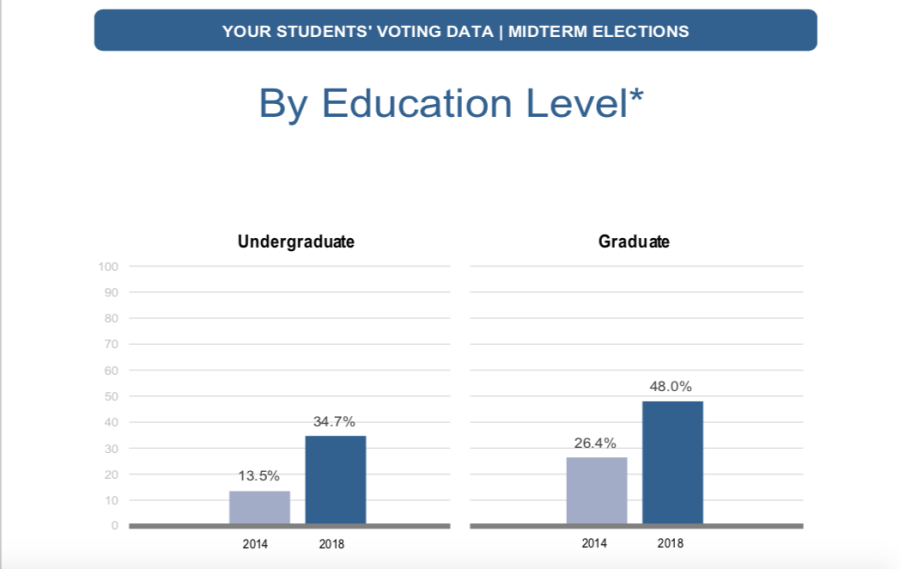Recent report says voting rate among students has increased
In a study conducted by the National Study of Learning, Voting and Engagement that compared 2014 and 2018 voter rates, Kent State’s rates have more than doubled.
The findings report that was released in September 2019, breaks down voter registration and voting by class level, age group, and field of study. Out of the 28,919 undergraduate students enrolled, both on main campus and regional campuses, 10,038 voted in the 2018 general elections.
Preparing for this year’s presidential election, USG has been registering students through its Kent State Votes initiative. Tiera Moore, the director of governmental affairs for USG, said they have registered around 300 students so far.
“Voter registration is something that I’m really passionate about and what I really wanted to work on,” Moore said. “The thing about college students [is] they’d rather hear it from another student on why it’s important to vote than somebody older than them.”
Before USG became involved, voter registration initiatives led by faculty or community members had trouble attracting students. While student involvement in the political process has increased, Moore still notices those who avoid the subject.
“I still do hear a lot of students say when I’m out tabling that they just don’t believe that their votes count,” Moore said. “I think that’s one of the biggest things with college students: they just really believe that it doesn’t make a difference.”
Moore described a trip to the Ohio Statehouse last semester in which she advocated for increased mental health services for higher education, an issue people were not entirely aware of. The trip made it clear legislators cannot make a change if they are not hearing the voices of the youth.
This feeling of responsibility was something that Alex Kaufman, a junior integrative studies major, touched upon too.
“If you don’t vote, you can’t complain,” Kaufman said. “If there’s something going on that you don’t like, then it’s your responsibility as a voter to go and take action.”
Feeling as though students oftentimes get their news through social media, Kaufman suggested they should be their own fact checkers and also take the time to become informed voters.
“Watch the debates, be informed on the candidates and their policy and make sure you know who you’re voting for and what you’re voting for,” Kaufman said.
Out of 31 students who were randomly surveyed, 28 said they were registered to vote. When asked if they planned to vote in the Ohio primary next month, 22 said they do plan to vote while six said they are undecided.
According to the Portage County Board of Elections, over 800 absentee ballots have been mailed out for the primary with 220 received.
Some students, such as junior political science major Leo Zimmerman, point to the results of the 2016 election as the reason Kent State students are paying more attention to politics.
“I do entirely think that the result of the election has gotten people far more interested in politics,” Zimmerman said. “I think people are starting to realize that it’s time for change and it’s time for all of us to get involved.”
Political science professors and student organizations communicating the importance of political involvement is another factor Zimmerman acknowledged. Students should realize how many sacrifices were made so they can vote, he said.
“I don’t really believe it’s a right to vote. I think it is a duty to vote,” Zimmerman said. “And I think if you are eligible and if you are capable, you need to go and vote.”
The Kent State Votes initiative will look to increase its number of student voters as it will host the event “Kent State Votes” from 5-8 p.m. on March 10 in the ballroom balcony of the Student Center. The event will register attendees and also introduce them to the political organizations on campus.
“Even though you’re one person,” Moore said, “you can still be a part of making a change.”
Chris Ramos covers politics. Contact him at [email protected].



